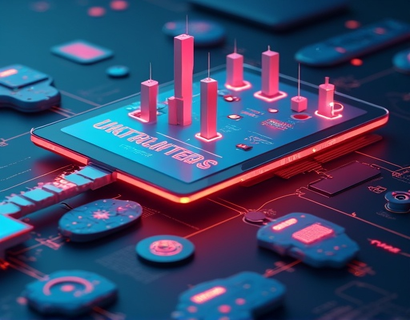Transforming User Engagement in the Digital Age: The Synergy of AI and Cryptocurrency
The digital landscape is undergoing a profound transformation, driven by the powerful integration of Artificial Intelligence (AI) and cryptocurrency. This synergy is not only revolutionizing how users interact with digital platforms but also enhancing security, efficiency, and innovation. For tech-savvy individuals and early adopters, understanding and leveraging this integration can significantly elevate their online presence and maximize their potential in the rapidly evolving digital world.
The convergence of AI and cryptocurrency is creating a new paradigm in digital engagement. AI technologies, with their ability to analyze vast amounts of data, learn from patterns, and make intelligent decisions, are finding unprecedented applications in the crypto space. Conversely, the decentralized and secure nature of cryptocurrency is providing a robust framework for AI to operate without the traditional bottlenecks of centralized systems.
Enhancing Security Through AI and Crypto Integration
One of the most significant benefits of integrating AI with cryptocurrency is the enhancement of security measures. Traditional security protocols often struggle to keep pace with sophisticated cyber threats. AI, however, can dynamically adapt to new threats by continuously learning and updating its defenses. In the context of cryptocurrency, this means more robust protection against hacking, fraud, and other malicious activities.
For instance, AI-driven systems can monitor blockchain transactions in real-time, identifying anomalies and potential security breaches instantly. Smart contracts, which are self-executing contracts with the terms directly written into code, can be enhanced with AI to automatically detect and prevent fraudulent activities. This not only safeguards user assets but also builds trust in the cryptocurrency ecosystem.
Improving Efficiency with AI-Powered Crypto Solutions
Efficiency is another area where the combination of AI and cryptocurrency shines. Cryptocurrency transactions, once known for their slow processing times and high fees, can be optimized through AI. Machine learning algorithms can predict transaction patterns and optimize routing, reducing delays and costs. This is particularly beneficial for cross-border transactions, where traditional financial systems often impose significant delays and fees.
Moreover, AI can streamline the process of mining, the computational process that validates transactions and adds them to the blockchain. By predicting the most efficient mining strategies and optimizing resource allocation, AI can make mining more profitable and environmentally sustainable. This not only benefits miners but also contributes to the overall stability and growth of the cryptocurrency network.
Innovative User Engagement Strategies
The integration of AI and cryptocurrency is also transforming user engagement on digital platforms. Traditional methods of user engagement, such as cookies and targeted ads, are being replaced by more sophisticated and privacy-respecting approaches. AI can analyze user behavior and preferences with greater accuracy, providing personalized experiences without compromising privacy.
For example, AI-driven chatbots powered by natural language processing (NLP) can offer real-time customer support, answering queries and providing recommendations based on individual user profiles. These chatbots can operate 24/7, ensuring that user needs are met at any time. Additionally, AI can curate content and offers that align with a user's interests, increasing engagement and satisfaction.
Decentralized Identity Management
One of the most promising applications of AI and cryptocurrency is in decentralized identity management. Traditional identity systems are centralized, making them vulnerable to breaches and misuse. Decentralized identity solutions, powered by blockchain and AI, offer a secure and user-controlled approach to managing digital identities.
AI can help in creating and verifying digital identities, ensuring that they are unique and secure. Blockchain technology ensures that these identities are tamper-proof and can be verified across different platforms without the need for intermediaries. This not only enhances security but also gives users more control over their personal data, fostering greater trust and adoption of digital services.
Tokenized Rewards and Incentives
AI and cryptocurrency are also revolutionizing reward and incentive systems on digital platforms. Tokenized rewards, where users earn cryptocurrency tokens for participating in specific activities, are becoming increasingly popular. AI can optimize these systems by analyzing user behavior to design more effective and engaging reward structures.
For instance, AI can predict which types of rewards are most appealing to different user segments, ensuring higher participation and engagement. Additionally, AI can dynamically adjust reward distributions based on real-time data, keeping users motivated and active on the platform. This approach not only enhances user engagement but also fosters a more loyal and active community.
Data Privacy and User Control
Data privacy is a critical concern in the digital age, and the integration of AI and cryptocurrency addresses this issue head-on. Traditional data handling practices often involve centralized storage and processing, making user data susceptible to breaches and misuse. Blockchain, combined with AI, offers a decentralized and transparent way to manage data.
Users can have full control over their data, deciding who can access it and for what purposes. AI can facilitate this by creating secure and efficient data-sharing protocols, ensuring that user consent is respected and data integrity is maintained. This not only enhances user trust but also complies with stringent data protection regulations, providing a competitive edge to platforms that adopt these technologies.
Future Prospects and Challenges
The future of AI and cryptocurrency integration holds immense potential, but it also comes with challenges. One of the primary challenges is the regulatory landscape. As these technologies evolve, regulators are still grappling with how to oversee them effectively. Platforms and developers must stay informed and proactive in navigating these regulations to ensure compliance and foster innovation.
Another challenge is the technical complexity involved in integrating AI and cryptocurrency. Developing robust and scalable solutions requires expertise in both domains. However, the growing number of specialized frameworks and tools is making this process more accessible. Collaboration between AI researchers, blockchain developers, and industry experts will be crucial in overcoming these technical hurdles.
Conclusion
The integration of AI and cryptocurrency is transforming user engagement in the digital age, offering enhanced security, efficiency, and innovation. For tech-savvy individuals and early adopters, embracing these advanced integration solutions can significantly elevate their online presence and maximize their potential in the rapidly evolving digital world. By staying informed and proactive, users can leverage the power of AI and cryptocurrency to achieve new levels of engagement and success.










































